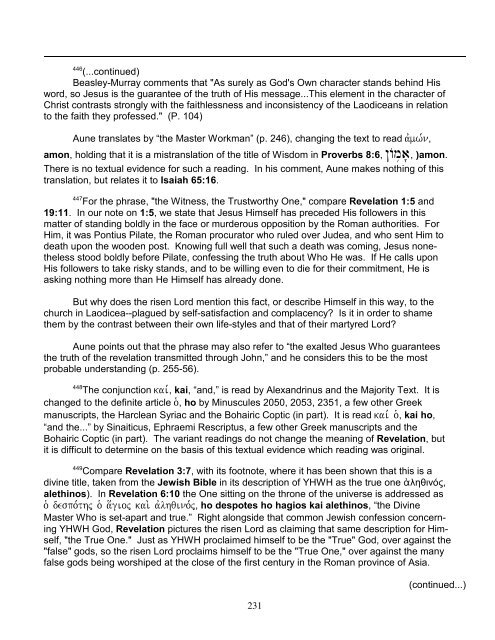Revelation 3:14-22 - Indepthbible.org
Revelation 3:14-22 - Indepthbible.org
Revelation 3:14-22 - Indepthbible.org
Create successful ePaper yourself
Turn your PDF publications into a flip-book with our unique Google optimized e-Paper software.
446<br />
(...continued)<br />
Beasley-Murray comments that "As surely as God's Own character stands behind His<br />
word, so Jesus is the guarantee of the truth of His message...This element in the character of<br />
Christ contrasts strongly with the faithlessness and inconsistency of the Laodiceans in relation<br />
to the faith they professed." (P. 104)<br />
Aune translates by “the Master Workman” (p. 246), changing the text to read avmw,n,<br />
amon, holding that it is a mistranslation of the title of Wisdom in Proverbs 8:6, !Amïa', )amon.<br />
There is no textual evidence for such a reading. In his comment, Aune makes nothing of this<br />
translation, but relates it to Isaiah 65:16.<br />
447<br />
For the phrase, "the Witness, the Trustworthy One," compare <strong>Revelation</strong> 1:5 and<br />
19:11. In our note on 1:5, we state that Jesus Himself has preceded His followers in this<br />
matter of standing boldly in the face or murderous opposition by the Roman authorities. For<br />
Him, it was Pontius Pilate, the Roman procurator who ruled over Judea, and who sent Him to<br />
death upon the wooden post. Knowing full well that such a death was coming, Jesus nonetheless<br />
stood boldly before Pilate, confessing the truth about Who He was. If He calls upon<br />
His followers to take risky stands, and to be willing even to die for their commitment, He is<br />
asking nothing more than He Himself has already done.<br />
But why does the risen Lord mention this fact, or describe Himself in this way, to the<br />
church in Laodicea--plagued by self-satisfaction and complacency? Is it in order to shame<br />
them by the contrast between their own life-styles and that of their martyred Lord?<br />
Aune points out that the phrase may also refer to “the exalted Jesus Who guarantees<br />
the truth of the revelation transmitted through John,” and he considers this to be the most<br />
probable understanding (p. 255-56).<br />
448<br />
The conjunction kai, kai, “and,” is read by Alexandrinus and the Majority Text. It is<br />
changed to the definite article o`, ho by Minuscules 2050, 2053, 2351, a few other Greek<br />
manuscripts, the Harclean Syriac and the Bohairic Coptic (in part). It is read kai, o`, kai ho,<br />
“and the...” by Sinaiticus, Ephraemi Rescriptus, a few other Greek manuscripts and the<br />
Bohairic Coptic (in part). The variant readings do not change the meaning of <strong>Revelation</strong>, but<br />
it is difficult to determine on the basis of this textual evidence which reading was original.<br />
449<br />
Compare <strong>Revelation</strong> 3:7, with its footnote, where it has been shown that this is a<br />
divine title, taken from the Jewish Bible in its description of YHWH as the true one ëçèéíüò,<br />
alethinos). In <strong>Revelation</strong> 6:10 the One sitting on the throne of the universe is addressed as<br />
o` despo,thj o` a[gioj kai. avlhqino,j, ho despotes ho hagios kai alethinos, “the Divine<br />
Master Who is set-apart and true.” Right alongside that common Jewish confession concerning<br />
YHWH God, <strong>Revelation</strong> pictures the risen Lord as claiming that same description for Himself,<br />
"the True One." Just as YHWH proclaimed himself to be the "True" God, over against the<br />
"false" gods, so the risen Lord proclaims himself to be the "True One," over against the many<br />
false gods being worshiped at the close of the first century in the Roman province of Asia.<br />
231<br />
(continued...)

















